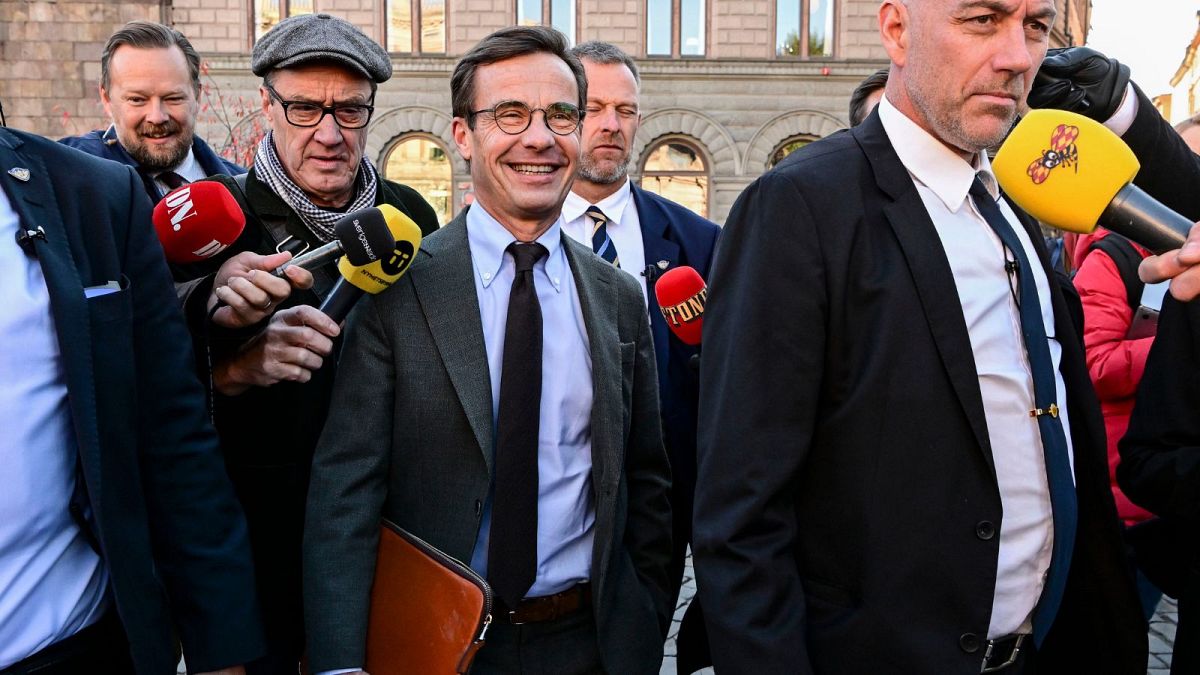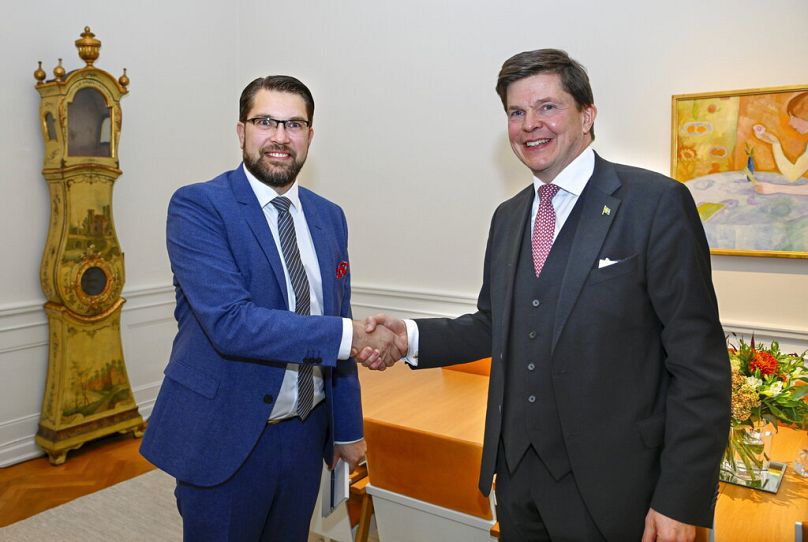Leaders of four right-wing political parties say they need a few more days to reach a deal.
Leaders of four right-wing political parties in Sweden say they need a few more days to strike a deal to form the country's new government, after a month of negotiations to hammer out a deal.
It's been four weeks since the general election on 11 September, and on the surface it looks like business as usual in the Nordic nation.
Incumbent Prime Minister Magdalena Andersson -- whose left-wing bloc narrowly lost the vote to the right-wing parties -- has represented her country at the recent European Political Community summit in Prague; she's been leading Sweden's response to explosions in the Nord Stream pipeline in the Baltic Sea, and on Tuesday called a special meeting of the country's 'crisis council' to update the latest on the investigation.
But her days in the job are numbered.
Behind the scenes, the four parties that formed the winning bloc in September's election have been negotiating, with few substantive leaks to indicate how things are going, until now.
A two-week extension from the Speaker of Parliament to the Sweden Democrats, Moderates, Liberals and Christian Democrats ran out on Wednesday and the politician hoping to be Sweden's next prime minister, Moderates leader Ulf Kristersson, said he has "asked the speaker to give me a couple of days".
At a Stockholm press conference on Wednesday, Kristersson said the four parties "have reached the goal, and we are in agreement, but there are details that need to be sorted out".
"I want to be able to present everything in a unified format and I will be able to do that on Friday," he said.
Kristersson has also proposed a vote in parliament to choose the new prime minister -- that is likely to see his candidacy rubber-stamped -- should now be able to take place on Monday.
So what are some of the political permutations at play?
Although the far-right anti-immigrant Sweden Democrats are the biggest party on the right, it's the second biggest party the Moderates who are leading the talks to form a new government.
That's because the Sweden Democrats and their leader Jimmie Åkesson are unpalatable enough that the other parties don't want to see them as the prime ministerial party.
But the Sweden Democrats "were in a brilliant position," going into these negotiations, said Professor Jonas Hinnfors at the University of Gothenburg.
So what are some of the political permutations we might see at the end of the week?
Scenario 1: Sweden Democrats are a formal part of the coalition government, with their political agenda forming a large part of the new administration's official programme. However, they've indicated they don't want to be inside government with the Liberals, so this could freeze the Liberals out of formal government, but nevertheless still support **a new coalition of Moderates, Sweden Democrats and Christian Democrats in parliament. **
Scenario 2: The Sweden Democrats are not a formal part of the government but they have secured a detailed set of commitments from the other parties with strict policy goals and timetables - they'd effectively be pulling the strings from behind the scenes, and Swedish media reports that they've already secured the leadership of four important parliamentary committees, and the role of deputy speaker of parliament.
Scenario 3: All four parties reach an agreement --- however uneasy -- with a unified government programme that they've been hammering out over the last month.
Either of the first two scenarios would leave would-be Prime Minister Ulf Kristersson relying on one party or another in a supply and confidence agreement to get any work done in parliament. He would potentially face the prospect of them voting against him, but this is no different to the way Magdalena Andersson had to work, relying on support from her left-wing allies in a minority government.
The third scenario would be the most unstable, bringing together parties and personalities that are fundamentally opposed to each other in so many areas: and if one party would get too aggressive or demanding, it could cause another to wobble and consider their place in the government.
"The four parties were on speaking terms before the election, and they agree on certain policy areas, but while they are on the same page about issues like nuclear power, stricter immigration rules, more police and longer sentences for criminals, there are huge areas where they do not agree," said Professor Hinnfors.
Some areas where the four parties obviously don't agree are around welfare payments -- how generous the state should be with unemployment or sickness benefits -- and levels of international aid.
There's also a gulf in political stances when it comes to human rights, minority rights, culture and media politics over how to deal with Sweden's public service broadcaster SVT, and crucially there are sticking points around identity politics and how "Swedish" society is.
"This is important for the Sweden Democrats, as they see themselves as the party of ethnic Swedes, and they want to define the civil service and public institutions as supporting their Swedish values," Professor Hinnfors told Euronews.
"On one side you've got the Liberals, and on the other side you have the Sweden Democrats, and not only are they not liberal, but they are anti-liberal. Illiberal," he added, noting that the Moderates have to try and negotiate the formation of a government when there's a great deal of mutual suspicion between the parties.
Until now the negotiations have been carried out by one senior representative from each party, but not the leaders themselves. However, on Saturday, the four right-wing party leaders met at a conference centre outside Stockholm.
This was perhaps, said Professor Hinnfors, a sign that their negotiators had reached an agreement and an announcement was close at hand.

